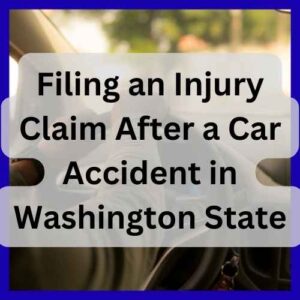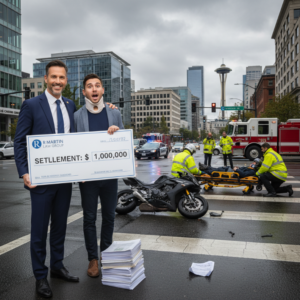If you’ve recently experienced a traffic collision in Bellevue or anywhere in King County, you may be wondering: Can I handle a car accident claim myself in Washington State? This is a common question for drivers hoping to avoid the cost of hiring a lawyer. The truth is, many straightforward claims involving minor injuries or property damage can successfully be managed on your own, provided you understand Washington’s insurance process and legal requirements. However, there are crucial legal nuances, strict deadlines, and negotiation hurdles that every self-represented claimant must know before proceeding.
Understanding Car Accident Claims in Washington State
Washington State’s roads see thousands of collisions annually. According to the WSDOT Annual Crash Data, the Seattle-Bellevue area ranks among the busiest for automobile accidents statewide. Most drivers will eventually face the question: How to file and negotiate a car accident insurance claim on your own in Washington?
Accident claims involve a series of formal steps requiring detailed documentation, timely communications, and a basic grasp of state law—especially Washington’s “pure comparative fault” system. If handled correctly, self-managed claims can save you legal fees and speed up the resolution process.
👉 Looking for a Personal Injury Lawyer Near Redmond, WA? Contact R Martin Law Group today for a free consultation.
Causes and Common Situations for Handling Your Own Claim
Before answering the question “Can I handle a car accident claim myself in Washington State without a lawyer?” consider these typical scenarios:
- Low-speed collisions with minor damage and no serious injuries
- Parking lot fender-benders
- No dispute about who was at fault
- Clear communication with cooperating insurance companies
For these cases, most injured drivers opt to handle claims directly with the insurance company. However, if you suffered moderate or severe injuries, your damages are extensive, or there is any disagreement about who caused the accident, navigating the legal system becomes riskier without professional representation.
Local Perspective: In King County, drivers are legally required to report any crash resulting in $1,000 or more of property damage or any injury, and must do so within four days if law enforcement does not file a report.
Key Steps Involved in Self-Handling a Car Accident Claim in WA
If you decide to represent yourself, follow these foundational steps to give your claim the best chance of success:
- Gather Scene Evidence: Take clear photographs, secure witness contact details, get all motorists’ insurance information, and write down everything you remember.
- Seek Immediate Medical Care: Why is medical documentation important when handling your own car accident claim in Washington? Detailed and timely medical records prove the link between the crash and your injuries—insurers use this to evaluate claims and may dispute any delays or missing records.
- File Required Collision Reports: As per RCW 46.52.030, failing to file within four days can impact your claim or even subject you to fines.
- Open Claims With Insurers: File with the at-fault party’s insurer or your own company (under PIP, UM/UIM coverage). Provide all documentation requested by adjusters.
- Negotiate Settlement Offers: Do not feel pressured to accept the first offer. Review all settlement details, ask about categories of loss included (medical costs, wage loss, pain and suffering, etc.), and counter low offers in writing with supporting evidence.
- Track All Costs: Journal your symptoms, save every receipt, and keep a record of lost work time and car repair estimates.
- Know When to Seek Help: If serious injuries, complex medical issues, or disputed liability are involved, or if you receive an extremely low offer, consulting with a Bellevue attorney can maximize your compensation and save critical time.
How Does Washington’s Comparative Fault Rule Affect Self-Represented Car Accident Claims?
One of the most unique features of Washington motor vehicle law is its “pure comparative fault” rule. This law directly impacts how much compensation self-represented claimants can receive. Understanding this rule is vital when learning how to file and negotiate a car accident insurance claim on your own in Washington.
- How the Rule Works: You can recover some damages even if you are partly at fault. For example, if you are deemed 30% at fault for a crash involving $50,000 in losses, your maximum recovery is $35,000 (i.e., reduced by your fault share).
- Why It Matters: Insurance companies often exaggerate the fault of unrepresented drivers to reduce payouts—even when the evidence does not support their claims. You should always review the basis of fault percentages and challenge unfair allocations.
- Documentation is Critical: Use clear scene photos, credible witness statements, and complete medical documentation to counteract arguments that you were at fault—these items can sway the negotiation in your favor.
Washington’s approach empowers self-claimants, but only if they are well-organized and proactive in defending their version of events.
Practical Example – Comparative Fault in Action
Example: In a Bellevue rear-end accident on NE 8th Street, the insurer argues you were “20% at fault” for suddenly braking. By providing dashcam footage showing another vehicle cut you off, your assigned fault might drop, increasing your recovery amount. This example shows how evidence and persistence can change outcomes even without an attorney involved.
Quick Fact: According to NHTSA and local data, more than 50% of insurance disputes in Washington cite “contributory negligence”—self-claimants with solid records are more likely to recover higher settlements.
Contact us today for a free consultation to see how we can help Redmond residents
Key Legal Rights and Deadlines for Self-Handled Claims
Anyone self-managing a car accident claim in Washington must be aware of critical legal windows and duties:
- Statute of Limitations: You have three years from the date of the accident to file a personal injury lawsuit. Missing this window almost always means losing your right to compensation.
- Reporting: If no police report is filed and damages exceed $1,000 or there is an injury, you must file a motor vehicle collision report within four days. Failure to do so could be used by insurers to question the validity of your claim.
- Damages: In addition to vehicle repairs and medical expenses, you may be entitled to compensation for lost wages, pain and suffering, and other out-of-pocket costs.
Tip: Bellevue and King County courts strictly enforce these deadlines, and local insurance adjusters are well versed in procedural defenses.
Practical Guidance & Case Examples in Bellevue/King County
To illustrate the process for handling a claim, consider this common Bellevue scenario:
- You are rear-ended at a traffic light in downtown Bellevue (minimal injuries, but car needs repairs totaling $3,000)
- You call 911, but police do not arrive because no one is seriously injured and roads are clear
- You exchange insurance information, take photos, seek a precautionary ER visit, and file the mandatory state report
- You report the crash to the other driver’s insurer and submit all requested documentation, including repair estimates and your ER bill
- The insurance company offers a settlement that covers repairs, but their records omit your out-of-pocket ER copayment—after submitting receipts and a written request, they increase the offer
Key lesson: Document thoroughly, respond promptly, and persistently advocate for each loss incurred.
The Insurance Company’s Role: What to Watch For
Insurance adjusters are trained negotiators whose job is to manage losses for their company. While many straightforward claims are resolved amicably, claimants in King County regularly report issues such as:
- Delays in reviewing or approving legitimate expenses
- Low initial settlement offers—sometimes less than actual repair costs
- Requests for recorded statements that may be later used to dispute your version of events
- Pushback when you include pain-and-suffering, lost wages, or out-of-pocket costs
According to Washington’s Insurance Commissioner, it’s legal to record all conversations with your adjuster (with their knowledge), and you should ask them to document every agreement made.
If your injuries worsen or your vehicle requires additional repairs, immediately notify the insurer in writing and attach updated documentation.
Risks, Challenges, and Your Legal Options
Self-handling your car accident claim in Washington may save attorney’s fees, but there are risks, especially in more complex cases:
- Insurers denying liability or minimizing fault for their policyholder
- Pre-existing injuries being used to justify reduced settlements
- Unexpected medical complications only emerging after you accept a release
- Missing the statute of limitations or a required report deadline
- Lack of knowledge about the full value of your claim, including intangible damages like emotional distress
If you’re not confident you’re being treated fairly or your damages are fully covered, talk to an experienced Bellevue car accident attorney.
Prevention and Next Steps Checklist
Even before an accident happens, you can prepare by understanding how to document and organize your claim from the start. Follow this checklist to streamline the process, or compare your current progress against these recommended steps:
- Carry your insurance and vehicle registration at all times.
- Install a dashcam for independent scene footage.
- Create a checklist of what to document after an accident (see below).
- Have contact information for local personal injury attorneys available.
- Keep digital copies of all accident-related records—photos, emails, bills—backed up safely.
- Know your medical providers and keep receipts for every service used.
- Journal every accident-related symptom and daily limitation, no matter how minor.
- Track all expenses and lost wages meticulously, with receipts and employer verifications.
- Mark the three-year deadline on your calendar and set reminders for required reports.
Essential Self-Claim Actions Checklist
- Document the accident scene (photos, weather, witnesses);
- Exchange insurance and driver information;
- Seek prompt medical evaluation and follow all treatment recommendations;
- File the mandatory police or collision report if required;
- Submit the claim to insurer (yours or the other driver’s);
- Keep a diary of medical symptoms and treatments;
- Save all communication with insurers in writing;
- Reject low settlement offers—negotiate with supporting evidence;
- Consult an attorney if: severe injury, faulty police report, insurer denies liability, or settlement is unfair.
Common Claim Elements and Timelines
| Step or Category | Time Limit | Key Documentation | Notes |
|---|---|---|---|
| Filing Collision Report | Within 4 days | Collision Report Form, Police/scene details | Required for damages ≥ $1,000 or injuries |
| Medical Documentation | Ongoing, begin immediately | ER/clinic records, bills, physician notes | Delays weaken claims |
| Claim Submission to Insurer | As soon as possible | Photos, claim forms, repair estimates | Early filing preserves rights |
| Negotiating Settlement | Varies (usually weeks to months) | Email/call logs, written offers & counteroffers | Refuse first lowball offer |
| Filing Lawsuit (if needed) | Within 3 years | Complaint, service affidavit, claim packet | Late filing forfeits right to compensation |
Frequently Asked Questions: Car Accident Claim Self-Handling in WA
1. Can I handle a car accident claim myself in Washington State without a lawyer?
Yes, many Bellevue and King County residents manage their own claims—particularly for smaller crashes with no serious injuries. Just be sure to document every step, adhere to deadlines, and know when to seek legal help if the process becomes too complex.
2. What steps are involved in self-handling a car accident claim in WA?
Start by collecting evidence at the scene, seeking immediate medical care, filing required reports, submitting insurance claims, negotiating settlements, and keeping every receipt and medical record. Review our checklist above for a full overview.
3. How to file and negotiate a car accident insurance claim on your own in Washington?
File promptly with the insurer (yours and/or the other driver’s), submit supporting documentation, respond promptly to adjuster requests, and always negotiate low settlement offers—never accept the first proposal if expenses aren’t fully covered.
4. Why is medical documentation important when handling your own car accident claim in Washington?
Insurers base settlement value primarily on medical records. Delays, gaps in treatment, or missing documentation make it easier for insurance companies to argue your injuries aren’t related or aren’t as significant as claimed.
5. How does Washington’s comparative fault rule affect self-represented car accident claims?
The pure comparative fault rule means your settlement is reduced by your percentage of fault. For self-represented claimants, this often requires careful evidence to minimize any attributed blame.
- Self-handling a car accident claim in Washington is possible for uncomplicated collisions, provided you stay organized and proactive.
- Strict documentation, adherence to legal deadlines, and an awareness of Washington’s comparative fault law are essential.
- Consult an attorney for severe injuries, high-value claims, disputed fault, or pushback from insurance companies.
- Local expertise matters—partner with a Bellevue-based lawyer like R Martin Law Group for tailored support.
Contact us today for a no-obligation consultation and take the first step towards finding peace of mind.
Call (425) 635-2000 to Discuss Your Case Details. 100% No Win No Fee Guarantee.








